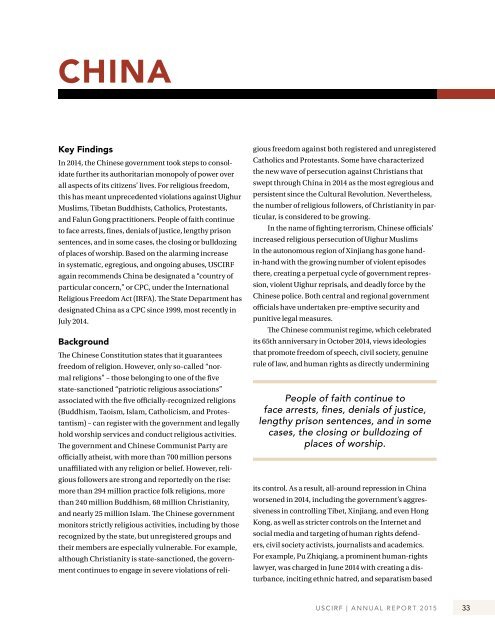USCIRF Annual Report 2015 (2)
USCIRF Annual Report 2015 (2)
USCIRF Annual Report 2015 (2)
Create successful ePaper yourself
Turn your PDF publications into a flip-book with our unique Google optimized e-Paper software.
CHINA<br />
Key Findings<br />
In 2014, the Chinese government took steps to consolidate<br />
further its authoritarian monopoly of power over<br />
all aspects of its citizens’ lives. For religious freedom,<br />
this has meant unprecedented violations against Uighur<br />
Muslims, Tibetan Buddhists, Catholics, Protestants,<br />
and Falun Gong practitioners. People of faith continue<br />
to face arrests, fines, denials of justice, lengthy prison<br />
sentences, and in some cases, the closing or bulldozing<br />
of places of worship. Based on the alarming increase<br />
in systematic, egregious, and ongoing abuses, <strong>USCIRF</strong><br />
again recommends China be designated a “country of<br />
particular concern,” or CPC, under the International<br />
Religious Freedom Act (IRFA). The State Department has<br />
designated China as a CPC since 1999, most recently in<br />
July 2014.<br />
Background<br />
The Chinese Constitution states that it guarantees<br />
freedom of religion. However, only so-called “normal<br />
religions” – those belonging to one of the five<br />
state-sanctioned “patriotic religious associations”<br />
associated with the five officially-recognized religions<br />
(Buddhism, Taoism, Islam, Catholicism, and Protestantism)<br />
– can register with the government and legally<br />
hold worship services and conduct religious activities.<br />
The government and Chinese Communist Party are<br />
officially atheist, with more than 700 million persons<br />
unaffiliated with any religion or belief. However, religious<br />
followers are strong and reportedly on the rise:<br />
more than 294 million practice folk religions, more<br />
than 240 million Buddhism, 68 million Christianity,<br />
and nearly 25 million Islam. The Chinese government<br />
monitors strictly religious activities, including by those<br />
recognized by the state, but unregistered groups and<br />
their members are especially vulnerable. For example,<br />
although Christianity is state-sanctioned, the government<br />
continues to engage in severe violations of religious<br />
freedom against both registered and unregistered<br />
Catholics and Protestants. Some have characterized<br />
the new wave of persecution against Christians that<br />
swept through China in 2014 as the most egregious and<br />
persistent since the Cultural Revolution. Nevertheless,<br />
the number of religious followers, of Christianity in particular,<br />
is considered to be growing.<br />
In the name of fighting terrorism, Chinese officials’<br />
increased religious persecution of Uighur Muslims<br />
in the autonomous region of Xinjiang has gone handin-hand<br />
with the growing number of violent episodes<br />
there, creating a perpetual cycle of government repression,<br />
violent Uighur reprisals, and deadly force by the<br />
Chinese police. Both central and regional government<br />
officials have undertaken pre-emptive security and<br />
punitive legal measures.<br />
The Chinese communist regime, which celebrated<br />
its 65th anniversary in October 2014, views ideologies<br />
that promote freedom of speech, civil society, genuine<br />
rule of law, and human rights as directly undermining<br />
People of faith continue to<br />
face arrests, fines, denials of justice,<br />
lengthy prison sentences, and in some<br />
cases, the closing or bulldozing of<br />
places of worship.<br />
its control. As a result, all-around repression in China<br />
worsened in 2014, including the government’s aggressiveness<br />
in controlling Tibet, Xinjiang, and even Hong<br />
Kong, as well as stricter controls on the Internet and<br />
social media and targeting of human rights defenders,<br />
civil society activists, journalists and academics.<br />
For example, Pu Zhiqiang, a prominent human-rights<br />
lawyer, was charged in June 2014 with creating a disturbance,<br />
inciting ethnic hatred, and separatism based<br />
<strong>USCIRF</strong> | ANNUAL REPORT <strong>2015</strong> 33


